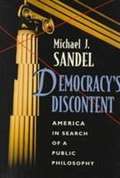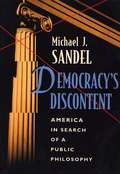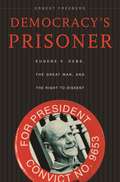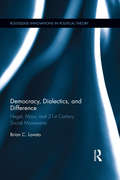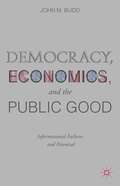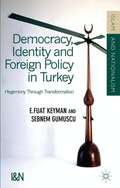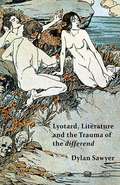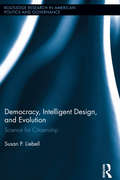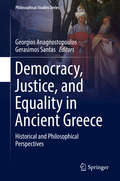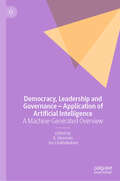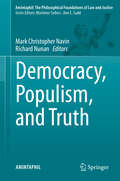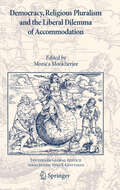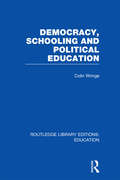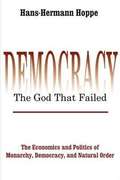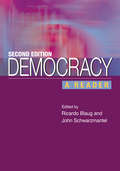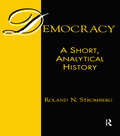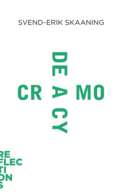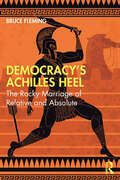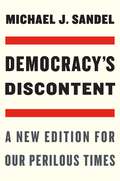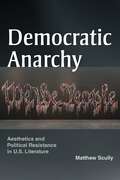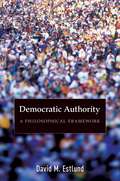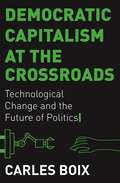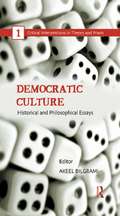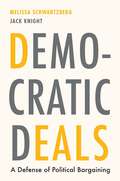- Table View
- List View
Democracy's Discontent: America in Search of a Public Philosophy
by Michael J. SandelThe defect, Sandel maintains, lies in the impoverished vision of citizenship and community shared by Democrats and Republicans alike. American politics has lost its civic voice, leaving both liberals and conservatives unable to inspire the sense of community and civic engagement that self-government requires. In search of a public philosophy adequate to our time, Sandel ranges across the American political experience, recalling the arguments of Jefferson and Hamilton, Lincoln and Douglas, Holmes and Brandeis, FDR and Reagan. He relates epic debates over slavery and industrial capitalism to contemporary controversies over the welfare state, religion, abortion, gay rights, and hate speech. Democracy's Discontent provides a new interpretation of the American political and constitutional tradition that offers hope of rejuvenating our civic life.
Democracy's Discontent: American in Search of a Public Philosophy
by Michael J. SandelDespite the success of American life in the last half-century—unprecedented affluence, greater social justice for women and minorities, the end of the Cold War—our politics is rife with discontent. Americans are frustrated with government. We fear we are losing control of the forces that govern our lives, and that the moral fabric of community—from neighborhood to nation—is unraveling around us. What ails democracy in America today, and what can be done about it? Democracy’s Discontent traces our political predicament to a defect in the public philosophy by which we live. In a searching account of current controversies over the role of government, the scope of rights and entitlements, and the place of morality in politics, Michael Sandel identifies the dominant public philosophy of our time and finds it flawed. The defect, Sandel maintains, lies in the impoverished vision of citizenship and community shared by Democrats and Republicans alike. American politics has lost its civic voice, leaving both liberals and conservatives unable to inspire the sense of community and civic engagement that self-government requires. In search of a public philosophy adequate to our time, Sandel ranges across the American political experience, recalling the arguments of Jefferson and Hamilton, Lincoln and Douglas, Holmes and Brandeis, FDR and Reagan. He relates epic debates over slavery and industrial capitalism to contemporary controversies over the welfare state, religion, abortion, gay rights, and hate speech. Democracy’s Discontent provides a new interpretation of the American political and constitutional tradition that offers hope of rejuvenating our civic life.
Democracy's Prisoner: Eugene V. Debs, the Great War, and the Right to Dissent
by Ernest FreebergIn 1920, socialist leader Eugene V. Debs ran for president while serving a ten-year jail term for speaking against America’s role in World War I. Though many called Debs a traitor, others praised him as a prisoner of conscience, a martyr to the cause of free speech. Nearly a million Americans agreed, voting for a man whom the government had branded an enemy to his country. In a beautifully crafted narrative, Ernest Freeberg shows that the campaign to send Debs from an Atlanta jailhouse to the White House was part of a wider national debate over the right to free speech in wartime. Debs was one of thousands of Americans arrested for speaking his mind during the war, while government censors were silencing dozens of newspapers and magazines. When peace was restored, however, a nationwide protest was unleashed against the government’s repression, demanding amnesty for Debs and his fellow political prisoners. Led by a coalition of the country’s most important intellectuals, writers, and labor leaders, this protest not only liberated Debs, but also launched the American Civil Liberties Union and changed the course of free speech in wartime. The Debs case illuminates our own struggle to define the boundaries of permissible dissent as we continue to balance the right of free speech with the demands of national security. In this memorable story of democracy on trial, Freeberg excavates an extraordinary episode in the history of one of America’s most prized ideals.
Democracy, Dialectics, and Difference: Hegel, Marx, and 21st Century Social Movements (Routledge Innovations in Political Theory)
by Brian C. LovatoIt has been nearly two centuries since Marx famously turned Hegel on his head in order to repurpose dialectics as a revolutionary way of thinking about the internal contradictions of our social relations. Despite critiques from post-structuralists, post-colonialists, and others, there has been a resurgence of dialectical thought among political theorists as of late. This resurgence has coincided with a rise in the mention of words like class warfare, socialism, and communism among the general public on the streets of Seattle in 1999, in Cairo’s Tahrir Square, in the actions of the Greek anarchists and the Spanish indignados, and in the rallying cry of "we are the 99%" of the Occupy Movement, and in academia. This book explores how it is that dialectical thought might respond to the critiques brought forth by those on the left who are critical of Marxism’s universalizing and authoritarian legacy. Brian C. Lovato singles out Ernesto Laclau and Chantal Mouffe as the key interlocutors in this ongoing conversation between Marxism and post-structuralism. Laclau and Mouffe argue that Marxist theory is inherently authoritarian, cannot escape a class-reductionist theory of revolutionary subjectivity, and is bound by a closed Hegelian ontology. Lovato argues the opposite by turning to two heterodox Marxist thinkers, Raya Dunayevskaya and C. L. R. James, in order to construct a radically democratic, dynamic, and open conceptualization of dialectical thought. In doing so, he advances a vision of Marxist theory that might serve as a resource to scholars and activists committed not only to combatting capitalism, but also to fighting against colonialism, patriarchy, white supremacy, and heteronormativity. The writings of Dunayevskaya and James allow for Marxism to become relevant again in these tumultuous early years of the 21st century.
Democracy, Economics, and the Public Good
by John M. BuddExamining essential aspects of American life, John Budd investigates how informational sources (print and broadcast media and other resources) fall short when it comes to informing citizens, failing our democracy and damaging the public good.
Democracy, Identity, and Foreign Policy in Turkey
by E. Fuat Keyman Sebnem GumuscuThe recent history of Turkey is dominated by the country's transformation into a modern democracy. Over the past few years Turkey has been increasingly recognised as a nation of economic, political and cultural significance as well as being a vital political connection between Europe and the Middle East. In this compelling volume, Professor Keyman and Dr. Gumuscu put democratisation in Turkey under the microscope with an especial focus on recent transformations under the Justice and Development Party (AKP). Accordingly, it explores to what extent Turkey's transformation under the AKP has led to democratic consolidation as well as asking if there is a disconnect between economic, cultural, and urban transformation, on the one hand, and democratic consolidation on the other? Furthermore, this book also takes the opportunity to explore several issues that have a direct effect on the consolidation of Turkish democracy such as globalization, foreign policy activism, the kurdish question, religious governance and civil society. By critically analyzing the dialectic between domestic transformations and global/regional dynamics, the book also discusses the ways in which Turkish transformation is affected by the Arab uprisings as well as how Turkey may inspire these countries. "
Democracy, Identity, and Foreign Policy in Turkey
by E. Fuat Keyman Sebnem GumuscuThis original study examines Jean-Fran#65533;ois Lyotard's philosophical concept of the differend and details its unexplored implications for literature. it provides a new framework with which to understand the discourse itself, from its Homeric beginnings to postmodern works by authors such as Michael Ondaatje and Jonathan Safran Foer.
Democracy, Intelligent Design, and Evolution: Science for Citizenship (Routledge Research in American Politics and Governance)
by Susan P. LiebellShould alternatives to evolution be taught in American public schools or rejected as an establishment of religion? Democracy, Intelligent Design, and Evolution argues that accurate science education helps shape a democratic temperament. Rather than defending against Intelligent Design as religion, citizens should defend science education as crucial to three aspects of the democratic person: political citizenship, economic fitness, and moral choice. Through an examination of Tammy Kitzmiller et al. v. Dover Area School District, contemporary political theory, and foundational American texts, this volume provides an alternative jurisprudence and political vocabulary urging American liberalism to embrace science for citizenship.
Democracy, Justice, and Equality in Ancient Greece: Historical and Philosophical Perspectives (Philosophical Studies Series #132)
by Georgios Anagnostopoulos Gerasimos SantasThe original essays in this volume discuss ideas relating to democracy, political justice, equality and inequalities in the distribution of resources and public goods. These issues were as vigorously debated at the height of ancient Greek democracy as they are in many democratic societies today. Contributing authors address these issues and debates about them from both philosophical and historical perspectives. Readers will discover research on the role of Athenian democracy in moderating economic inequality and reducing poverty, on ancient debates about how to respond to inborn and social inequalities, and on Plato’s and Aristotle’s critiques of Greek participatory democracies. Early chapters examine Plato’s views on equality, justice, and the distribution of political and non-political goods, including his defense of the abolition of private property for the ruling classes and of the equality of women in his ideal constitution and polis. Other papers discuss views of Socrates or Aristotle that are particularly relevant to contemporary political and economic disputes about punishment, freedom, slavery, the status of women, and public education, to name a few. This thorough consideration of the ancient Greeks' work on democracy, justice, and equality will appeal to scholars and researchers of the history of philosophy, Greek history, classics, as well as those with an interest in political philosophy.
Democracy, Leadership and Governance – Application of Artificial Intelligence: A Machine-Generated Overview
by Jos Chathukulam K. GireesanIn today’s rapidly evolving political landscape, the intersection of democracy, leadership, and governance with artificial intelligence (AI) has become a focal point for academic inquiry and practical explorations. This book is a machine-generated literature overview that explores the opportunities, challenges, and impacts of integrating AI technologies in democratic processes, leadership dynamics, and sustainable governance. Through a collection of thought-provoking chapters, readers will gain insights into the transformative potential of AI that revisits the tenets of deliberative democracy, redefines leadership roles, and rejuvenates public service delivery. This volume offers a comprehensive exploration of the processes and practices of democratic decision-making, leadership development, and sustainable governance. It serves as a valuable resource to academics, policymakers, and practitioners navigating through the concepts, dimensions, and praxis of democracy, leadership, and governance. It is an important value addition to the body of knowledge and paves the way for informed decision-making and responsible application of digital technologies for good governance.
Democracy, Populism, and Truth (AMINTAPHIL: The Philosophical Foundations of Law and Justice #9)
by Mark Christopher Navin Richard NunanThis book tackles questions related to democracy, populism and truth, with results that are sure to inform pressing academic and popular debates. It is common to describe many of today’s most energizing politicians and political movements as populist. Some are progressive advocates of greater economic democracy or individual rights, while others are recognizably authoritarian and anti-democratic, even while claiming to defend democracy. What all populist leaders share in common is a rhetorical approach: their ability to articulate, or at least profess to channel, the wishes of ‘the people’, a group that populist leaders claim a unique ability to understand and govern, especially with regard to their dissatisfaction with ruling elites. They decry corruption (although not necessarily with any sincerity), and they sometimes identify more mainstream politicians and bureaucrats as ‘enemies of the people.’ The rise of populist politics raises pressing questions about the nature of populism, but also about relationships between populism and democratic institutions. For example, is populism ever a democratic tendency, or does its invocation of a monolithic demos (‘the people’) signify a fundamentally anti-democratic worldview? Populist political rhetoric also raises concerns about the relationship between truth, democracy, and journalistic integrity. While the history of anti-democratic advocacy (famously illustrated by Plato) has often highlighted the tendency of a democratic style of politics to prioritize popularity over truth, the development of social media—and evolving norms of journalistic communication and public political discourse—raise these misgivings in new forms.
Democracy, Religious Pluralism and the Liberal Dilemma of Accommodation
by Monica MookherjeeHow should liberal democratic governments respond to citizens as religious believers whose values, norms and practices might lie outside the cultural mainstream? Some of the most challenging political questions arising today focus on the adequacy of a policy of 'live and let live' liberal toleration in contexts where disputes about the metaphysical truth of conflicting world-views abound. Does liberal toleration fail to give all citizens their due? Do citizens of faith deserve a more robust form of accommodation from the state in the form of 'recognition'. This issue is far from settled. Controversies over the terms of religious accommodation continue to dominate political agendas around the world. This is the first edited collection to provide a sustained examination of the politics of toleration and recognition in an age of religious pluralism. The aftermath of the events of September 11th have dramatised the urgency of this debate. It has also surfaced, nationally and globally, in disputes about terrorism, security and gender and human rights questions in relation to minority communities. This volume brings together a group of new and established scholars from the fields of law and philosophy, who all present fresh and challenging perspectives on an urgent debate. It will be indispensable reading for advanced researchers in political and legal philosophy, religious and cultural studies and related disciplines.
Democracy, Schooling and Political Education (Routledge Library Editions: Education)
by Colin WringeThe relationship between educational practice and the social principles of democracy forms an important strand in the history of educational thought, and is central to the debate on many contemporary issues in the educational field. In this concise, introductory book, Colin Wringe examines the nature of this relationship, taking account of developments in the theory of democracy and educational controversy. In particular he considers the relevance of differing interpretations of democracy to the following questions: the defence of selection, the extension of private education, the function of education as an instrument of oppression, the democratisation of educational institutions, and the development of a form of specifically political education in schools. The importance of an understanding of political and social issues for educational practice at school and classroom level is emphasized from the outset.
Democracy, the God that Failed: The Economics and Politics of Monarchy, Democracy and Natural Order
by Hans-Hermann HoppeHoppe calls for an alignment of conservatism and libertarianism and suggests, among other things, that the production of defense should be undertaken by insurance companies on the free market.
Democracy: A Reader
by Ricardo BlaugDemocracy is an essential collection of source texts by major historical figures on the value of democracy, key concepts and practices, theoretical perspectives, and contemporary challenges. The volume includes reflections on democracy by Machiavelli, Hobbes, Madison, Mill, Lincoln, and Paine. It features Rousseau and Kant on freedom and autonomy; Locke on equality; Burke and Bakunin on representation; Wollheim and Tocqueville on majority rule; and Crick on citizenship. Conservative, Marxist, socialist, and feminist critiques are followed by new sections on the market, civil society, participation, the Internet, nationalism, religion, multiculturalism, cosmopolitan democracy, and violence. Perfect for course use, the book provides an unparalleled introduction to standard articulations of democracy and its multiple manifestations in our interconnected, conflict-ridden world.
Democracy: A Short, Analytical History
by Roland N. StrombergThis text sums up the democratic experience in modern Western civilisation. It defines the term and notes the confusions in it, and its changing meanings over the past two centuries or so. It records criticisms, and is especially concerned with the conditions that are neccessary for it to exist. This encompasses a comprehensive literature which the author seeks to summarise and present to the reader in accessible form. It is appropriate material for course reading in Westen civilisation, intellectual history, political thought, and philosophy.
Democracy: Conceptualization, Measurement, And Explanation (Reflections)
by Svend-Erik SkaaningA short but engaging look at democracy: what it is, how it compares to other forms of rule, and why it makes a difference.What is democracy? And even if it can be defined, can true democracy ever be achieved? Without a definition, dictators can pose as democrats and the oppressed can see despotism as the answer to their prayers. But true democracy, author Svend-Erik Skaaning argues, will not automatically solve the world's problems. It is contentious and unfair, even as it keeps tyrants at bay. In Democracy, Skaaning defines democracy, charts its rise, revival, and resurgence across history and nations, and discusses when democracy has made a difference—and when and why it has failed. ReflectionsIn Reflections, a series copublished with Denmark's Aarhus University Press, scholars deliver 60-page reflections on a key concept that encapsulates their years of study and research. These books present unique insights on a wide range of topics and concepts—everything from love, trust, and play to corruption, welfare, and sleep—that entertain and enlighten readers with exciting discoveries and new perspectives.
Democracy’s Achilles Heel: The Rocky Marriage of Relative and Absolute
by Bruce FlemingDemocracy’s Achilles Heel argues that the structure of democracy is a combination of two incompatible worldviews: one relativist and liberal, the other absolutist and conservative. This combination of opposites is essential for its survival, yet places democracy at risk since each worldview is prone to trying to engulf the other, creating threats from both the right and the left. This is democracy’s Achilles heel: it never goes away and can only be avoided. The nature of open societies means that absolutisms, for example of a religious kind, can exist quite comfortably within democracy, yet for democracy to succeed, they must permit other belief systems and worldviews, absolute or otherwise, to exist alongside them. Likewise, relativism can undermine the liberal nature of democracy itself in seeking to reduce the existence of absolutisms to nothing, thus threatening freedom and destabilizing democracy. Reacting to the recent clashes in Western democracies between left and right, and drawing on the theories of such now-classic thinkers as Fromm, Berlin, and Hoffer, as well as more recent sources such as Levitsky and Ziblatt’s How Democracies Die, the author moves beyond the usual defenses of democracy, accepting the fact that democracy, because of its combination of opposites, is always unstable and always at risk, while urging those who live within democratic polities to strengthen its chances of survival by remembering its fundamental value and purpose. An impassioned defense of the democratic way of life even given (and indeed because of) its eternally threatened nature, Democracy’s Achilles Heel will appeal to scholars, students, and readers with interests in political sociology, philosophy, and political theory.
Democracy’s Discontent: A New Edition for Our Perilous Times
by Michael J. SandelA renowned political philosopher updates his classic book on the American political tradition to address the perils democracy confronts today.The 1990s were a heady time. The Cold War had ended, and America’s version of liberal capitalism seemed triumphant. And yet, amid the peace and prosperity, anxieties about the project of self-government could be glimpsed beneath the surface.So argued Michael Sandel, in his influential and widely debated book Democracy’s Discontent, published in 1996. The market faith was eroding the common life. A rising sense of disempowerment was likely to provoke backlash, he wrote, from those who would “shore up borders, harden the distinction between insiders and outsiders, and promise a politics to ‘take back our culture and take back our country,’ to ‘restore our sovereignty’ with a vengeance.”Now, a quarter century later, Sandel updates his classic work for an age when democracy’s discontent has hardened into a country divided against itself. In this new edition, he extends his account of America’s civic struggles from the 1990s to the present. He shows how Democrats and Republicans alike embraced a version of finance-driven globalization that created a society of winners and losers and fueled the toxic politics of our time.In a work celebrated when first published as “a remarkable fusion of philosophical and historical scholarship” (Alan Brinkley), Sandel recalls moments in the American past when the country found ways to hold economic power to democratic account. To reinvigorate democracy, Sandel argues in a stirring new epilogue, we need to reconfigure the economy and empower citizens as participants in a shared public life.
Democracy’s Slaves
by Paulin IsmardChallenging the modern belief that democracy and bondage are incompatible, Paulin Ismard directs our attention to ancient Athens, where the functioning of civic government depended on skilled, knowledgeable experts who were literally public servants—slaves owned by the city-state rather than by private citizens.
Democratic Anarchy: Aesthetics and Political Resistance in U.S. Literature
by Matthew ScullyA dramatic and necessary rethinking of the meaning of DemocracyDemocratic Anarchy grapples with an uncomfortable but obvious truth inimical to democracy: both aesthetics and politics depend on the structuring antagonism of inclusion and exclusion. Yet in Democratic Anarchy, Matthew Scully asks, how can “the people” be represented in a way that acknowledges what remains unrepresentable? What would it mean to face up to the constitutive exclusions that haunt U.S. democracy and its anxious fantasies of equality?Synthesizing a broad range of theoretical traditions and interlocutors—including Lacan, Rancière, Edelman, and Hartman—Democratic Anarchy polemically declares that there has never been, nor can there ever be, a realized democracy in the U.S. because democracy always depends on the hierarchical institution of a formal order by one part of the population over another. Engaging with an expansive corpus of American literature and art (Harriet Jacobs, Nathaniel Hawthorne, Louis Zukofsky, Thomas Pynchon, Toni Morrison, Theresa Hak Kyung Cha, Nari Ward, Ocean Vuong, and Safiya Sinclair), Democratic Anarchy argues that many liberal concepts and institutions are in fact structurally opposed to democratic equality because they depend on regulating what can appear and in what form.By focusing on works that disrupt this regulatory impulse, Scully shows how rhetorical strategies of interruption, excess, and disorder figure the anarchic equality that inegalitarian fantasies of democracy disavow. Democratic Anarchy develops a rigorous theory of equality that refuses to repeat the inequalities against which it positions itself, and it does so by turning to moments of resistance—both aesthetic and political—inaugurated by the equality that inheres in and antagonizes the order of things.
Democratic Authority: A Philosophical Framework
by David EstlundDemocracy is not naturally plausible. Why turn such important matters over to masses of people who have no expertise? Many theories of democracy answer by appealing to the intrinsic value of democratic procedure, leaving aside whether it makes good decisions. In Democratic Authority, David Estlund offers a groundbreaking alternative based on the idea that democratic authority and legitimacy must depend partly on democracy's tendency to make good decisions. Just as with verdicts in jury trials, Estlund argues, the authority and legitimacy of a political decision does not depend on the particular decision being good or correct. But the "epistemic value" of the procedure--the degree to which it can generally be accepted as tending toward a good decision--is nevertheless crucial. Yet if good decisions were all that mattered, one might wonder why those who know best shouldn't simply rule. Estlund's theory--which he calls "epistemic proceduralism"--avoids epistocracy, or the rule of those who know. He argues that while some few people probably do know best, this can be used in political justification only if their expertise is acceptable from all reasonable points of view. If we seek the best epistemic arrangement in this respect, it will be recognizably democratic--with laws and policies actually authorized by the people subject to them.
Democratic Capitalism at the Crossroads: Technological Change and the Future of Politics
by Carles BoixAn incisive history of the changing relationship between democracy and capitalismThe twentieth century witnessed the triumph of democratic capitalism in the industrialized West, with widespread popular support for both free markets and representative elections. Today, that political consensus appears to be breaking down, disrupted by polarization and income inequality, widespread dissatisfaction with democratic institutions, and insurgent populism. Tracing the history of democratic capitalism over the past two centuries, Carles Boix explains how we got here—and where we could be headed.Boix looks at three defining stages of capitalism, each originating in a distinct time and place with its unique political challenges, structure of production and employment, and relationship with democracy. He begins in nineteenth-century Manchester, where factory owners employed unskilled laborers at low wages, generating rampant inequality and a restrictive electoral franchise. He then moves to Detroit in the early 1900s, where the invention of the modern assembly line shifted labor demand to skilled blue-collar workers. Boix shows how growing wages, declining inequality, and an expanding middle class enabled democratic capitalism to flourish. Today, however, the information revolution that began in Silicon Valley in the 1970s is benefitting the highly educated at the expense of the traditional working class, jobs are going offshore, and inequality has risen sharply, making many wonder whether democracy and capitalism are still compatible.Essential reading for these uncertain times, Democratic Capitalism at the Crossroads proposes sensible policy solutions that can help harness the unruly forces of capitalism to preserve democracy and meet the challenges that lie ahead.
Democratic Culture: Historical and Philosophical Essays (Critical Interventions in Theory and Praxis)
by Akeel BilgramiA collection of essays by distinguished scholars, this book delineates a substantial conception of democracy, the great promise as well as the pitfalls of a democratic mentality and culture. These essays go beyond the institutional and formal descriptions of democracy to its underlying cultural context — expressed both historically and analytically, descriptively and normatively.
Democratic Deals: A Defense of Political Bargaining
by Jack Knight Melissa SchwartzbergTwo leading scholars of democracy make the case for political bargaining and define its proper limits.Bargains—grand and prosaic—are a central fact of political life. The distribution of bargaining power affects the design of constitutions, the construction of party coalitions, legislative outcomes, judicial opinions, and much more. But can political bargaining be justified in theory? If it inevitably involves asymmetric power, is it anything more than the exercise of sublimated force, emerging from and reifying inequalities?In Democratic Deals, Melissa Schwartzberg and Jack Knight defend bargaining against those who champion deliberation or compromise, showing that, under the right conditions and constraints, it can secure political equality and protect fundamental interests. The challenge, then, is to ensure that these conditions prevail. Drawing a sustained analogy to the private law of contracts—in particular, its concepts of duress and unconscionability—the authors articulate a set of procedural and substantive constraints on the bargaining process and analyze the circumstances under which unequal bargaining power might be justified in a democratic context. Institutions, Schwartzberg and Knight argue, can facilitate gains from exchange while placing meaningful limits on the exercise of unequal power.Democratic Deals examines frameworks of just bargaining in a range of contexts—constitution-making and legislative politics, among judges and administrative agencies, across branches of government, and between the state and private actors in the course of plea deals. Bargaining is an ineradicable fact of political life. Schwartzberg and Knight show that it can also be essential for democracy.
